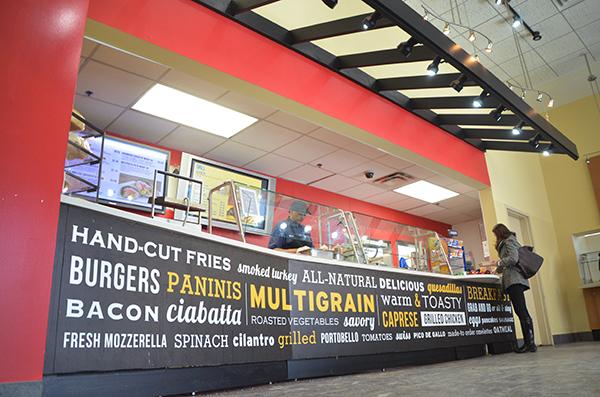A group of students will push University President Steven Knapp to commit to dramatically increasing how much food on campus is sustainable and bought from companies that treat workers fairly.
The 30-member Food Justice Alliance is asking top administrators to increase the amount of “real food” – food that is beneficial to workers, animals and the planet – to at least 20 percent of all campus dining hall options by 2020.
That figure is now between 1 and 5 percent, said senior Jesse Schaffer, who has spent spent months analyzing invoices from food service company Sodexo, one of GW’s largest contractors. The group plans to deliver the Real Food Campus Commitment to Knapp on Earth Day, April 22.
Schaffer, who is leading the effort, said most students “have no idea” how their food gets from farm to table. He believes it’s crucial to teach students about the “real food” movement to shift their behaviors and mindsets.
“The Real Food Challenge is a way to actualize these values at GW and use GW’s huge purchasing power to change the food system,” Schaffer said.
The Office of Sustainability “fully endorses the student-led effort,” spokeswoman Ronda Chapman-Duer wrote in an email.
“By not only changing the way we buy food, but increasing awareness around the issue, the impact will be long lasting and extend far beyond the GW campus,” Chapman-Duer wrote. She hopes to see the commitment signed this spring, but GW would first need to better assess its current offerings.
Under the commitment, students would work with Sodexo to visit local farms and make a plan for identifying “real food” sources. The Food Justice Alliance will also work with the Office of Sustainability, the Urban Food Task Force and the Student Association on the details of the project.
Twenty-one university presidents – including those at Johns Hopkins University and University of Massachusetts at Amherst – have signed on to the challenge.
The students have partnered with John Berger, a coordinator for the national organization Real Food Challenge, on their lobbying effort. He said he would help students to create “the different accountability mechanisms that will make sure that the school and the dining halls go through all the things that they’re going to need to.”







